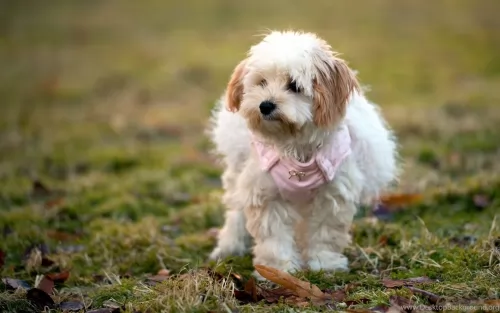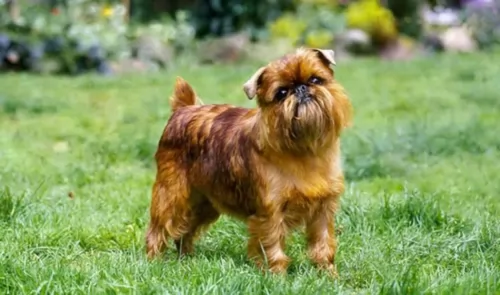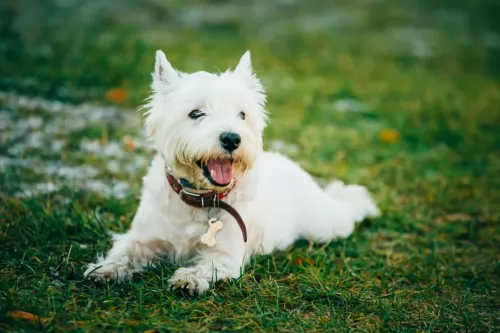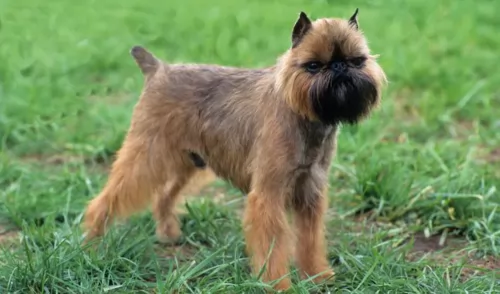 Petzlover
Petzlover West Highland White Terrier is originated from United Kingdom but Belgian Griffon is originated from Belgium. West Highland White Terrier may grow 10 cm / 4 inches higher than Belgian Griffon. Both West Highland White Terrier and Belgian Griffon are having almost same weight. Both West Highland White Terrier and Belgian Griffon has almost same life span. West Highland White Terrier may have more litter size than Belgian Griffon. West Highland White Terrier requires High Maintenance. But Belgian Griffon requires Moderate Maintenance
West Highland White Terrier is originated from United Kingdom but Belgian Griffon is originated from Belgium. West Highland White Terrier may grow 10 cm / 4 inches higher than Belgian Griffon. Both West Highland White Terrier and Belgian Griffon are having almost same weight. Both West Highland White Terrier and Belgian Griffon has almost same life span. West Highland White Terrier may have more litter size than Belgian Griffon. West Highland White Terrier requires High Maintenance. But Belgian Griffon requires Moderate Maintenance
 The West highland white terrier originated from Poltalloch in Scotland. So they were initially called as Poltalloch terrier and after that they were called as Roseneath terrier. They were initially used for hunting fox, badger, otter and in killing the vermin like rats.
The West highland white terrier originated from Poltalloch in Scotland. So they were initially called as Poltalloch terrier and after that they were called as Roseneath terrier. They were initially used for hunting fox, badger, otter and in killing the vermin like rats.
The breed history says that Colonel Malcolm of Poltalloch was the reason for the Westie's white colour. This is because in 19th centuryhe went for hunting with his dogs and accidentally he shot his dog as its colour was as fox. So he decided to breed only white colour dogs.
 The Belgian Griffon isn’t your most attractive dog, but maybe its his quirky, gremlin looks that makes him such an adored pet for many. There are different varieties of Griffon, and the Belgian- and Brussels Griffon are one and the same. All small Belgian dogs have the same breed standards, with the Belgian having a rough coat The dog hails from Belguim and its ancestors were no doubt a mix of the Belgian street dog, the Stable Griffon and the Affenpinscher.
The Belgian Griffon isn’t your most attractive dog, but maybe its his quirky, gremlin looks that makes him such an adored pet for many. There are different varieties of Griffon, and the Belgian- and Brussels Griffon are one and the same. All small Belgian dogs have the same breed standards, with the Belgian having a rough coat The dog hails from Belguim and its ancestors were no doubt a mix of the Belgian street dog, the Stable Griffon and the Affenpinscher.
Later on in the 1800s, this combination was then crossed with the Pug, giving the dog the brachycephalic or flat faced look.
Unfortunately no written records were kept about the precise origin of this breed, but there is also the idea that the King Charles- and English Toy Spaniel were also involved in its development. These small dogs were bred to catch rats in the barns of European estates.
 The Westie can be said as that a small dog having the talents of the big dog. They are very popular for their obedience. They are also working as therapy dogs and also some in search and rescue teams. The home having Westie will have fun always and be enthusiastic. They will suit them for country or city living, but they like to live with their family. They are well suitable for apartment living, but some training should be given to them for not barking. They can stay in home when you are at work. Westie can be taken to travel, whether it may be long vacation or a short visit.
The Westie can be said as that a small dog having the talents of the big dog. They are very popular for their obedience. They are also working as therapy dogs and also some in search and rescue teams. The home having Westie will have fun always and be enthusiastic. They will suit them for country or city living, but they like to live with their family. They are well suitable for apartment living, but some training should be given to them for not barking. They can stay in home when you are at work. Westie can be taken to travel, whether it may be long vacation or a short visit.
They are quick learners and so training them is not difficult. Mistakes of them can be corrected patiently since they don't like harsh activities against them. Westie will definitely bark when he sees something or hear different sounds. He will bark on seeing visitors or even other dogs. Sometimes they will bark for very silly things but when given appropriate training in their young stage, they can bark only for alerts.
 There are different variations of this dog to give it its distinctive look and size. This quaint looking little Griffon canine comes with two different coat types - soft or wiry. With the Belgian Griffon, his wiry coat of red, tan or black will need to be brushed at least twice a week. Shedding with this dog is seasonal.
There are different variations of this dog to give it its distinctive look and size. This quaint looking little Griffon canine comes with two different coat types - soft or wiry. With the Belgian Griffon, his wiry coat of red, tan or black will need to be brushed at least twice a week. Shedding with this dog is seasonal.
He has a compact, sturdy little body, and he trots around with attitude. With his sharp pointed ears and whiskers, he has been given the nickname ‘bearded dog’. His dark black eyes are alert. He is self-confident, intelligent and curious breed, a great family pet and good with children if he has grown up with them in the home. He is good with other pets. The fact that this is a small breed and that he doesn’t have excessive energy levels, means he is adaptable to city- and country living.
 The Westie is friendly with children but not all the time. So some care should be taken while they are near children.
The Westie is friendly with children but not all the time. So some care should be taken while they are near children.
They like to chase rodents like rabbits as they are interested in hunting.
They are suitable for apartment living unless they are left alone for a very long time. They love cold weather more than hot.
They can be trained by giving some extra efforts.
 The Belgian Griffon is an affectionate pet and often establishes a strong bond with one member of the family. You’ll have your Griffon with you for about 15 years so make sure he is trained and a pleasure to have around.They are difficult to train, being somewhat stubborn so they are going to require patience. They’re sensitive too, and they won’t respond well to aggressive treatment.
The Belgian Griffon is an affectionate pet and often establishes a strong bond with one member of the family. You’ll have your Griffon with you for about 15 years so make sure he is trained and a pleasure to have around.They are difficult to train, being somewhat stubborn so they are going to require patience. They’re sensitive too, and they won’t respond well to aggressive treatment.
They’re much more indoor dogs than outdoor dogs because they’re also vulnerable to heat stroke. They just want to come indoors and be with their human family, and when you do that for them, they’ll become a wonderful friend and companion to you.
 When you get your Griffon from a reputable breeder, you always have a better chance that he’ll be healthy. As it is, the Belgian Griffon has few hereditary health issues. However his dark eyes will have some genetic problems to contend with and he could suffer with progressive retinal atrophy. This is an illness which can lead to blindness
When you get your Griffon from a reputable breeder, you always have a better chance that he’ll be healthy. As it is, the Belgian Griffon has few hereditary health issues. However his dark eyes will have some genetic problems to contend with and he could suffer with progressive retinal atrophy. This is an illness which can lead to blindness
Syringomyelia – this is a neurological condition – an abnormality of the spinal cord – a disease which occurs more frequently in small breeds. It can cause your pet to endure a lot of pain.
Birthing Issues - these little dogs often have problems with giving birth, and a vet often has to intervene and perform a cesarean.
 The puppy should be fed 3 to 4 times per day as it requires a considerable amount for their growth. Cooked chicken breast and turkey are best for them and also vegetables should be given to them. Beef and chicken should be kept a limit as it will lead to itchy skin and allergies.
The puppy should be fed 3 to 4 times per day as it requires a considerable amount for their growth. Cooked chicken breast and turkey are best for them and also vegetables should be given to them. Beef and chicken should be kept a limit as it will lead to itchy skin and allergies.
The preferable food for the Westie is home cooked. The home food will only contain all the essential nutrients for the Westie.
Eventhough the Westie is suitable for apartment living it is recommended to have a daily walk for him to be active and refreshing.
They should be made to play for atleast 30 minutes per day for their health as to not gain overweight. Grown up children can play with them as they like it.
 The Belgian Griffon will do well if you invest in high quality foods. You can make your own, but if you’re concerned about his health, it would be best to check what ingredients should go into his home-prepared meals to ensure he gets all the vitamins and minerals he needs.
The Belgian Griffon will do well if you invest in high quality foods. You can make your own, but if you’re concerned about his health, it would be best to check what ingredients should go into his home-prepared meals to ensure he gets all the vitamins and minerals he needs.
If you want to go with commercially manufactured dog foods, check with your vet about wet- and dry foods. Your vet will help with choosing a food appropriate to his size and age. Always ensure that there is clean, fresh water available to your pet.
Even though he is a small breed, he is fairly active and he will need his fair share of exercise like ball games and walks. Training and socialization are a must for him. You’ll notice that training isn’t particularly easy with this breed, and first time dog owners might not have the patience with him.